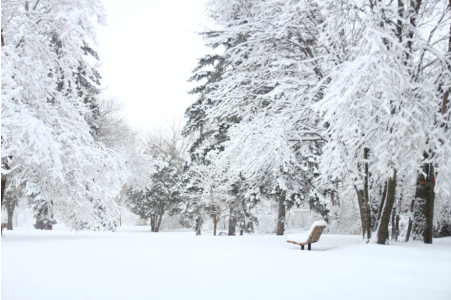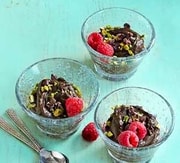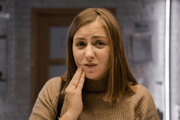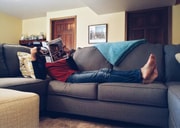Freeze your way to better sleep? Scientists say intense cold could be the secret!
By
Aubrey Razon
- Replies 0
As we age, getting a good night’s sleep often becomes more challenging and a common topic of conversation.
But what if the secret to unlocking the door to dreamland was as simple as, well, chilling out? Literally.
A recent study from the University of Poitiers in France has sparked a flurry of interest with its frosty findings.
Researchers suggest that a brisk 5-minute session in a cryostimulation chamber, where temperatures plummet to a bone-chilling -90 °C (-130 °F), could significantly improve sleep quality and mood. It's a concept that might leave you cold, but the science is heating up.
The study, which involved 20 healthy participants with an average age of 23, took place over five days.
Each day, these brave souls stepped into the icy embrace of a cryochamber, a place colder than the coldest winter day most of us have ever experienced.
After their sub-zero spa session, they continued their day sans alcohol, caffeine, and strenuous exercise.
As night fell, the participants were adorned with sensors to monitor their brain and heart activity, transforming them into sleep-study cyborgs.
The morning after, they filled out questionnaires to report on their slumber experience.
The results were as surprising as a snowball in July.
The researchers observed a notable increase in slow-wave sleep – the deep, restorative phase of our sleep cycle – by an average of 7.3 minutes during the first two sleep cycles.
This is the kind of sleep that's like a spa treatment for your brain, known to play a crucial role in memory function.
Interestingly, the study also uncovered that the benefits of this cold therapy were particularly pronounced in women, suggesting that men and women might respond differently to the treatment.
While the study didn't delve into the nitty-gritty of how the cold affects sleep quality, it did build on existing evidence that whole-body cryostimulation (WBC) can soothe the heart post-exercise, reduce inflammation, and enhance overall well-being.
Now, it seems, we can add better sleep to the list of chilly benefits.
The use of cold for therapeutic purposes isn't new.
It dates back to ancient Greece, where cold baths were all the rage among philosophers and athletes alike.
And this isn't just a placebo effect; other studies have shown similar benefits in elite athletes, who often use cryotherapy to recover from intense physical exertion.
For now, we can take comfort in knowing that researchers are exploring every avenue to help us sleep better.
And who knows? Maybe one day, we'll all be saying “goodnight” with a quick “freeze.”

What do you think about the idea of using intense cold to improve sleep? Would you be willing to give it a try, or does the thought leave you feeling cold? Share your thoughts, experiences, and any sleep tips you've discovered in your own journey to a restful night.
But what if the secret to unlocking the door to dreamland was as simple as, well, chilling out? Literally.
A recent study from the University of Poitiers in France has sparked a flurry of interest with its frosty findings.
Researchers suggest that a brisk 5-minute session in a cryostimulation chamber, where temperatures plummet to a bone-chilling -90 °C (-130 °F), could significantly improve sleep quality and mood. It's a concept that might leave you cold, but the science is heating up.
The study, which involved 20 healthy participants with an average age of 23, took place over five days.
Each day, these brave souls stepped into the icy embrace of a cryochamber, a place colder than the coldest winter day most of us have ever experienced.
After their sub-zero spa session, they continued their day sans alcohol, caffeine, and strenuous exercise.
As night fell, the participants were adorned with sensors to monitor their brain and heart activity, transforming them into sleep-study cyborgs.
The morning after, they filled out questionnaires to report on their slumber experience.
The results were as surprising as a snowball in July.
The researchers observed a notable increase in slow-wave sleep – the deep, restorative phase of our sleep cycle – by an average of 7.3 minutes during the first two sleep cycles.
This is the kind of sleep that's like a spa treatment for your brain, known to play a crucial role in memory function.
Interestingly, the study also uncovered that the benefits of this cold therapy were particularly pronounced in women, suggesting that men and women might respond differently to the treatment.
While the study didn't delve into the nitty-gritty of how the cold affects sleep quality, it did build on existing evidence that whole-body cryostimulation (WBC) can soothe the heart post-exercise, reduce inflammation, and enhance overall well-being.
Now, it seems, we can add better sleep to the list of chilly benefits.
The use of cold for therapeutic purposes isn't new.
It dates back to ancient Greece, where cold baths were all the rage among philosophers and athletes alike.
And this isn't just a placebo effect; other studies have shown similar benefits in elite athletes, who often use cryotherapy to recover from intense physical exertion.
For now, we can take comfort in knowing that researchers are exploring every avenue to help us sleep better.
And who knows? Maybe one day, we'll all be saying “goodnight” with a quick “freeze.”
Key Takeaways
- A new study shows that intense cold exposure, through a daily 5-minute session in a cryostimulation chamber at -90 °C, could improve sleep quality and mood after a few days.
- The research, conducted at the University of Poitiers in France, particularly highlighted an increase in slow-wave sleep, which is associated with memory function and restorative benefits.
- The study found that women and men may respond differently to the cold treatment, suggesting a possible need to adjust the cold dose according to gender.
- While the small study did not explore the detailed mechanisms linking intense cold to improved sleep, it supports the notion that whole-body cryostimulation may have various therapeutic benefits, including better sleep quality and decreased anxiety.







